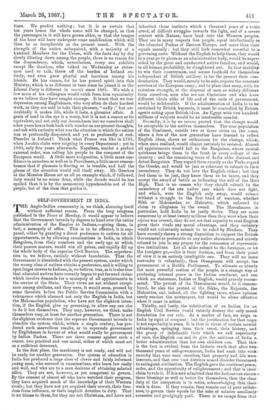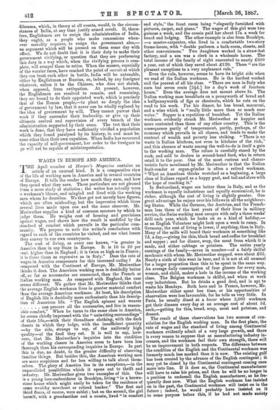SELF-GOVERNMENT IN INDIA.
THE Anglo-Indian community is, we think, alarming itself without sufficient reason, From the long telegram published in the Times of Monday, it would appear to believe that the Government intends by degrees to hand over the entire administration of the Empire to Indians,—giving them, in fact, a monopoly of office. This is to be effected, it is sup- posed, either by granting a direct preference to natives for all appointments, or by allowing examinations in India, in which Bengalees, from their numbers and the early age at which their powers mature, would win all prizes, and rapidly fill up the whole body of the superior Civil Service. The apprehen- sion is, we believe, entirely without foundation. That the Government is dissatisfied with the present system, under which the wrong class of natives obtains a preference, and is willing to open larger careers to Indians, is, we believe, true, as it is also true that educated natives have recently begun to put forward claims which involve demands for a monopoly of all appointments in the service of the State. Their views are not without accept- ance among civilians, and they were, it would seem, pressed by some theorists before the Public Service Commission with a vehemence which alarmed not only the English in India, but the Mahomedan population, who have not the slightest inten- tion, if the English give up governing, to allow any one else to do it but themselves. They may, however, we think, make themselves easy, at least for another generation. There is not the slightest evidence that the supreme Government intends to abandon the system which, within a single century, has pro- duced such marvellous results, or to supersede government by Englishmen in favour of what would really be government by Indian Pashas. There are three reasons against such a course, two practical and one moral, either of which must act as a sufficient deterrent.
In the first place, the machinery is not ready, and will not be ready for another generation. Our system of education in India has produced a large class of clever and fairly informed young men, who succeed in examinations, who learn law easily and well, and who are to a man desirous of obtaining salaried office. They are not, however, as yet competent to govern. By the consent of almost all who have watched their progress, they have acquired much of the knowledge of their Western rivals ; but they have not yet acquired their morale, their free- dom from influence, or their implicit devotion to duty. That bine blame to them, for they are not Christians, and have not
inherited those instincts which a thousand years of a noble creed, of difficult struggles towards the light, and of a severe contest with Nature, have bred into the Western peoples. They are in many respects fine people, equal intellectually to the educated Pashas of Eastern Europe, and more than their equals morally ; but they still lack somewhat essential to a. governing caste. Without the English to help them, they would in a year go to pieces as an administrative body, would be super- seded by the great and uneducated native families, and would, in all human probability, be slaughtered out. In that inability, to win their countrymen, and secure foothold for themselves, independent of British artillery, is for the present their con- demnation. They would, merely to be safe, require the constant services of the European army ; and to place that army, with its- resistless strength, at the disposal of men so widely different from ourselves, men who are not Christians and who have different ideals alike of life and of the ends of government, would be indefensible. If the administration of India is to be sustained by British bayonets, it must be controlled by British agents acting upon British ideas. An Egypt with two hundred, millions of subjects would be an intolerable scandal.
Secondly, it is by no means proved that the change would. be acceptable to the natives themselves. The true population of the Continent, outside two or three cities on the coast, where a few of the new generation have learned to reflect English ideas, shows no enthusiasm for the change, which, when once realised, would almost certainly be resisted. Almost all appointments would fall to the Bengalees, whose mental. quickness brings them to the front in every college of the country ; and the remaining races of India alike distrust and detest Bengalees. They regard them exactly as the Turks regard the Greeks, and would be jest as reluctant to submit to their ascendency. They do not lore the English either; but they feel them to be just, they know them to be brave, and they accept the award of battle as indicating the will of the Most High. That is no reason why they should submit to the ascendency of the one native race which does not fight, and which, were the English only away, would submit without a struggle to the first band of warriors, whether Sikh or Mahomedan or Mahratta, which enforced its claim to allegiance by the sword. The Mussnlmans, in particular, hold India to be justly theirs. They are more numerous by at least twenty millions than they were when their regime was overset, they do not see that capacity to read English.. gives their rivals any moral advantage, and they certainly, would not voluntarily submit to be ruled by Hindoos. They have recently shown a strong disposition to support the British Government as preferable to any native alternative, and utterly refused to join in any prayer for the concession of representa- tive institutions. Let all alike submit to the foreigner, or let the foreigner go,—this is their decision, and from their point of view it is an entirely intelligible one. They will no more surrender it voluntarily, than Orangemen will accept. the government of a Dublin Parliament. To alienate so utterly the most powerful section of the people, is a strange way of producing internal peace in the Indian continent, and one which no statesman, Indian or English, would gravely reoomv mend. The protest of the Museulmans would, be it remem- bered, be also the protest of the Sikhs, the Rajpoote, the Mahrattas, and, indeed, all the fighting races, whose opinion rarely reaches the newspapers, but would be alone effective when it came to action.
Thirdly, and lastly, the substitution of an Indian for an English Civil Service would entirely destroy the only moral foundation for our rule. As a matter of fact, we reign in. India by right of conquest ; but the justification for that reign is not superiority in arms. It is that in virtue of certain mental advantages, springing from their creed, their history, and- the group of indefinable facts which we call superiority, of race, the English can and do give the millions of India a: better administration than her own children can. That this is the fact is evident from the historic truth that after two. thousand years of self-government, India had sunk into suck: anarchy that wars were ceaseless, that property and life were insecure, and that over vast districts armed disorder threatened to extinguish civilisation. The English gave the continent peace, order, and the opportunity of enlightenment; and that is their claim to rule it. If it is now admitted that the Indians can ensure these blessings as well or better for themselves, then the clear duty of the conquerors is to retire, acknowledging that their . work is done. If they remain, they remain out of pure selfish- ness, to govern their equals for the sake of salaries needlessly._ excessive and grudgingly paid. There is no escape from that
dilemma, which, in theory at all events, would, in the circum- stances of India, at any time justify armed revolt. If, there- fore, Englishmen are to resign the administration of India, they ought, as a people who make concessions when- ever morality requires, to resign the government also,— an argument which will be pressed on them some day with effect. We do not doubt that it is their duty to make their government vivifying, or question that they are performing this duty in a way which, when the vivifying process is com- plete, will compel them to retire. When the masses, especially of the warrior races, have reached the point of morale at which they can trust each other in battle, India will be untenable, either by Englishman or Russian, or, indeed, by any foreigner whatever, unless it be the Chinese, who does not shrink, when opposed, from extirpation. At present, however, the Englishmen are resolved to remain, and remaining, they are bound to do their appointed work, which is precisely that of the Roman people,—to plant so deeply the idea of government by law, that it never can be wholly replaced by the idea of government by will. They cannot pursue that work if they surrender their leadership, or give up their ultimate control and supervision of every branch of the administration supported by their arms. The test that their work is done, that they have sufficiently vivified a population which they found paralysed by its history, is, and must be, none other than their own expulsion. When India has recovered the capacity of self-government, her order to the foreigner to go will not be capable of misinterpretation.















































 Previous page
Previous page